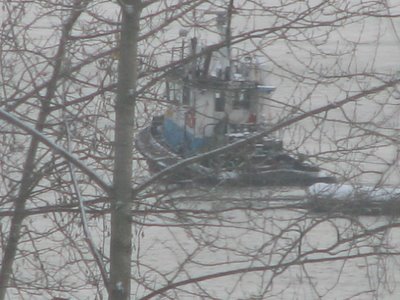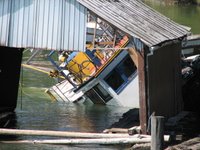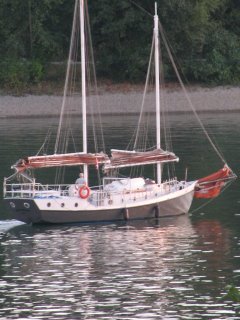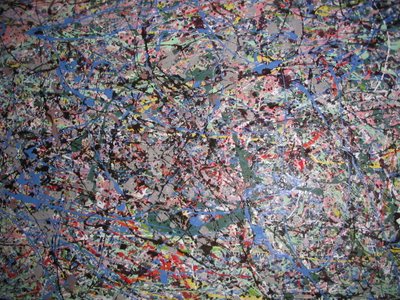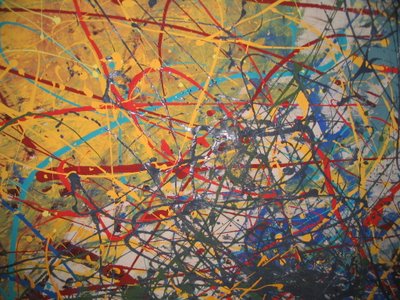The Maple Ridge NEWS once published a column called 'Radio Free Haney'. Radio Haney the blog comments on issues and events here in the District of Maple Ridge. The historical Haney neighourhood is so named after early settler Thomas Haney.
Monday, December 25, 2006
Thanks
This one will be short.
Often – too often really – we hear the sirens of the Paramedics as they rush through our streets to or from one emergency or accident or another.
I’m not sure about others, but when I hear the sirens or as I pull over onto the shoulder with flashing lights either coming fast towards me in my rearview mirror or dashing straight towards me, I habitually reflect on who the patient may be in the ambulance. An elderly person, a young person, a man, a woman, a child, a mum or dad?
This afternoon I was the person in the ambulance. I suffered a seizure of sorts in the Haney Place Mall. As a long time critic of the Mall I suspect the Mall was trying to tell me something. That was at around 2:300PM. It is now 6:52PM.
Thankfully my daughter Olivia was with me and thankfully she was kindly assisted by a caring passerby who will forgive me for me mentioning his name; Jeff Dumont. When perfect strangers pounce on the opportunity to help a stranger in distress, we are reminded that none of us are strangers really.
I said this was going to be short. Sorry. Nearly done.
I want to thank so much those folks in Haney Place Mall who helped my daughter, and I want to thank the paramedics for the unbelievable job they did for me and for what they continue to do in this community.
The transition from the ambulance to emerge was lighting fast and flawless. The professionalism displayed by Dr. Willems and Dr. Auersberg was good humoured and relaxed.
And finally. The pages of the NEWS and TIMES have seen too much Andrupian pontificating over the years and one subject I never touch on has been healthcare in this province. I have never understood why the Fraser Valley Health Authority gets such a spanking from the critics; people who attack our healthcare system need to spend some time in other jurisdictions in other countries (almost any country you can think of) if they want to get a taste of failing healthcare systems. A short drive across the border south should be illuminating enough.
In the background the discussion of the two-tier system builds momentum rather than fades. If people feel the urge to pay big bucks for the incredible medical attention I received three hours ago let them have at it. It is after all, their money.
As I said, this letter was going to be short. I guess I’m on the naughty list now for lying.
Claus Andrup
Port Haney
Friday, December 22, 2006
2006 "Most Deserving Of Each Other" awards
- George W. Bush and Saddam Hussein
- Paris Hilton and Britney Spears
- Rosie O'Donnell and Donald Trump
Friday, December 15, 2006
Perfidious Albion part deux
In the context of discovering Vancouver:
"Steering to the north, Captain Thorn arrived in a few days at Vancouver's Island, and anchored in the harbor of Neweetee, very much against the advice of his Indian interpreter, who warned him against the perfidious character of the natives of this part of the coast."
In the context of Maple Ridge (2007):
As Maple Ridge turns its attentions once again to the future of the Albion flood plain situated in its western quadrant the word 'perfidious' - a wonderful world with nasty connotations - rolls around in my mind.
We are reminded of the word once again in today's news reports coming from the celebrated and original Perfidious Albion, England.
Very British solution to Saudi problem
By Paul Reynolds World affairs correspondent, BBC News website
Eurofighter at heart of UK/Saudi relationsThere will be a few wry smiles in foreign ministries around the world, particularly perhaps at the Quai D'Orsay in Paris and the state department in Washington, at news that the corruption investigation into a huge British defence contract with Saudi Arabia has been suddenly ended.
Foreign competitors will see another performance by 'perfidious Albion', as the British government holds its hand on its heart and promises that commercial interests have played no part.
British lectures on the "rule of law" will lose some of their force.
Other governments - and frankly, many of the British workers engaged on the project - will not believe that the size of the contract in question was not the determining factor. It is for 72 Typhoon Eurofighters from BAE.
BAE had reported that negotiations were at a standstill until the Saudis knew what was going to happen.
There was talk that Saudi Arabia might turn to the US and buy some F-15s instead, or to the French and its Eurofighter rival, the Rafale.
The fact is that the sale of fighters to Saudi Arabia has largely determined British relations with the kingdom for more than 20 years
The connection:
When the Maple Ridge Albion Area plan is complete and presented to the public one wonderw to what extent the public and certain groups in the District will be forced to reflect on react in similarly to the way the world has reacted to Perfidious Albion in the case of F-15s scandal. In other words will be too be asking this question:
"..........competitors (read opposing proponents - SmartCentres v. the sports/cultural/environment lobby) will see another performance by 'perfidious Albion', as the British (read District of Maple Ridge) government holds its hand on its heart and promises that commercial interests have played no part."
An intriguing prospect indeed.
Thursday, December 14, 2006
A postcard from hell.
Observers and historians of the middle-east accept that the religious divide between Sunni and Shiite goes back some 1300 years. In modern history when the Europeans first show up on the doorstep of the Arab world they do so with the promise of democracy in one hand and the threat of the gun in the other. Looking back, the scene of chaos is evident. And worse, instead of history fading away it seems now to be catching up with the present.
CNN this week displayed a map which graphically portrayed the Sunni factions of Jordan, Syria, Saudi Arabia and a portion to the east of Iraq where Sunnis dominate lined up against the Shiite strongholds represented by Iran and the majority of Iraqis who are themselves Shiite. For simplicity’s sake we in the West have to discard the hundreds of sub-factions which exist within the Sunni and Shiite parent groups. And for the sake of sanity we are forced to ignore the near futile struggle of the men, women and children who are maimed or killed by the dozen each day in the region as though helpless on the conveyor belt of human conflict and mayhem as it continues its unstoppable journey through their lives.
We look for justification and see only religious disagreement, the hunger for wealth via control of the region’s oil and gas resources and third the raw fear that drives all war, the fear of being dominated by another, the fear of losing self-reliance, the fear of not being in control of one’s life. Ask a slave or someone living under a dictator about that particular fear, they will explain it.
Looking back on the history of the West we have not been without conflict and looking back we can consider ourselves fortunate that things, well, worked out the way they did. It has been painful, true. Yet in a melancholy way, we are doing as best we can. And it is no wonder we feel that our own experience at stitching together the various nations and factions of the West could point to solutions in the East. It is, from a distance, an odd way in which we pretend to want to help. First we try to impose our religious beliefs on the Arab world (and not the Arab world alone) and just as the prospect of conversion fades the prospect of oil wealth raised its head and in no time the West arrived yet again in the middle-east.
For some reason the West has never been able to shake or rid itself of the notion that it had some tenure or the other in lands and cultures far away. Not alone, the Moors and others down history have proven also to covet the resources of lands far afield. In today’s world we understand that pitfalls of foreign invasion. Saddam Hussein learned in his ill-planned invasion of Kuwait that the world is not accepting of military bullying. And in fairness to the US it did well to respond as it did through Desert Storm in coming to the aid of Kuwait. And for the cynical, yes one can argue that the US acted as much in self-interest as it did in human interest.
All along throughout the passage of these events and conflicts, the 1300 year battle for supremacy in the middle-east between Sunni and Shiite has smoldered, bubbled and lingered in the hearts and minds of sullen and mistrustful leaders who saw no other end to the battle but victory over one another. In 2006 we see in graphic horror the burned and bloody victims of this conflict each day. And in the West we are forced – or we force it upon ourselves out of a sense of duty or perhaps somewhat less honourable reasons – to embed ourselves in this conflict in the hope that as a world coalition we may somehow influence the outcome of the Sunni-Shiite wars of this century, the 14th straight century of non-stop war. Are we in the West being realistic?
Where, for instance, Israel and the US, North Korea and Iran dominated our airwaves and the internet for decades, the talk now is reduced, thanks in part to sentiments coming this week from Saudi Arabia’s rulers, simply to the fact that the middle-east will never be at peace until either the Sunni or Shiite dominate or divide.
Dominate or divide. It is hard for the US and coalition forces to accept themselves as no more than a meddling irritant in the affairs of the Muslim universe, specifically in Iraq and Afghanistan. On the other hand the upheaval we see in the middle-east becomes less of a conundrum when one views it as being a result of the fact that the peoples of the middle-east are today straddling the past and the future. Nowhere is this more evident than where democracy as we understand comes in contact or attempts to blend with religious beliefs in the middle-east.
Many, many men and women aspire to the perceived order that we believe we have built for ourselves in the West. Just as many feel as certainly, that the West has evolved as a result of hundreds of years of corruption and avarice and sin into a hell from which there can be no salvation. Head and shoulders above all of this the Sunni-Shiite conflict will dominate the world scene for many years to come.
Some of us may recall the days prior to the US forces entering Baghdad and remember the words that made us scoff? Saddam Hussein and his seemingly demented information minister threatened that the US would, to paraphrase their threats: “enter the gates of hell if they entered Iraq…….” Now that George W. Bush has ‘decided’ to stay the course, years after having declared his mission complete, one is tempted to first to put more authority into Saddam Hussein’s threats and perhaps reflect on the sequence of George Bush’s statements. He may well have chosen to first stay the course and once that had been achieved then declare that the mission was complete.
It is hard to believe that the US and coalition forces and the good people of Iraq do not feel that they are now well past the gates of hell and deep inside hell itself. And neither Shiite nor Sunni can guide them out. What to do, what to do?
Monday, December 11, 2006
The battle for the Albion in Maple Ridge will commence with an Area Plan.

Thursday, December 07, 2006
True dat!
Friday, December 01, 2006
Revitalization of Old Haney in Maple Ridge gathers momentum thanks to local property owner, Seiko Huang.
The plight of Old Haney was the subject of much discussion during the 2004/5 SmartGrowth on the Ground sessions - a series of stakeholder driven workshops and charettes - where 224th street in its entirety was seen as a focal point for bringing life back to the down centre. Since then a number of developers have begun taking advantage of the densification program intitiated by the SmartGrowth on the Ground principles. 18 townhouses were recently completed (and sold out) on Fraser Street in the heart of Haney. A large 100 unit condominium project is udnerway on the east side of Haney on the haney Bypass. The Maple Ridge Historical Society has successfully completed the intitial design of an $8million dollar museum expansion adjacent to Haney House, the key historic building in the area.
The proposed Holiday Inn on 224th Street in the vicinity of Haney House and the new museum will accelerate the much needed revitalization of this key economic and residential area of Maple Ridge. Visitors and residents alike in the very near future will find themselves within walking distance of all the town's amenities and retail stores. In addistion the District has made great strides with its local transport and infrastructure programs which will all combine to help Maple Ridge reach its full potential and prepare itself for the completion of the Golden Ears Bridge in 2009. The phrase 'unprecedented growth' will have to be redefined once Maple Ridge shows its face to the outside world.
Thursday, November 30, 2006
AND THEN I WOKE UP.
"Iraqi forces 'ready by mid-2007'
Mr Maliki said training of Iraqi forces will be stepped upIraqi Prime Minister Nouri Maliki has said Iraqi forces will be ready to assume security control of the country in June 2007.
"Iraqi forces will be... fully ready to receive this command," Mr Maliki said in an interview with US ABC TV, to be aired later on Thursday.
He was speaking hours after holding talks with US President George W Bush in the Jordanian capital, Amman.
Mr Bush has said US troops will remain in Iraq "until the job is complete".
The president said after their meeting that it was important to speed up training for the Iraqi security forces."
Seems Bush and Maliki smoked more than cigars after the dinner they didn't have. The show rolls on.
Wednesday, November 29, 2006
What we learned today.
There is a certain arrogance attached to the notion that once be elected - even twice - one can calmly set about changing the way things are done half way around the world.
What we learned today is that world leaders need to think a lot deeper before opening their mouths, let alone acting on their thoughts.
Can it get any more complicated than it already is? Probably.
The peoples of the US deserve our sympathy, but with each passsing hour their elected officials make it harder and harder for the US to find a shoulder to cry on. What to do, what to do?
Tuesday, November 28, 2006
Crude but to the point - 2010 World Cup opinion.
"LISTEN BROTHER
PLEASE GET THIS OUT TO RELAVANT FOLK, FIFA IF YOU CAN
I CANNOT BELIEVE THAT THEY ARE STILL WANTING TO HOST 2010 IN S.A.
THE ARGUEMENT IS STILL ON WHERE TO BUILD THE GREEN POINT STADIUM , SPENDING BILLIONS FOR ONE MATCH
WE HAVE THE POOR NEEDING HOUSING, WATER AND ELECTRICITY
WE HAVE A JUSTICE SYSTEM WHEREBY THE CRIMINALS HAVE ALL THE RIGHTS AND THE VICTIMS ZILCH
LAST WEEK A FATHER SODOMIZED HIS 3MNTH OLD CHILD AND IS OUT ON BAIL....HALOOOOOOO
CRIME IS SOOO HIGH HERE, AND BELIEVE ME THIS IS ONLY THE PRACTISE RUN FOR THECRIMINALS, THE REAL SHIT WILL HAPPEN IN 2010
WE HAVE A NON EXISITANT TRANSPORT SYSTEM
THE HOSPITALS ARE COLLAPSING
THERE IS NO INFRASTRUCTURE
WHY ON EARTH DO ALL THESE PEOPLE WANT TO COME HERE TO BE FED INTO A LIONS DEN AND CHOMPED,
PRAY IT DOES GO TO AUSSIE AND HERE MONEY GETS USED INSTEAD TO HOUSE THE POOR AND GET THE COUNTRY BACK TO NORMALITY AND DO SOMETHING ABOUT THE CRIME......WHICH IS ESCALATING OUT OF CONTROL
I CANNOT BELIEVE THEY THINK WE CAN DO IT
WHAT YA THINK
JAXSON"
Define national recognition
Moreover, how does Quebec stack up against accepted definitions of the word 'nation'?
na·tion (nā'shun) n.
A relatively large group of people organized under a single, usually independent government; a country.
The territory occupied by such a group of people: All across the nation, people are voting their representatives out.
The government of a sovereign state.
A people who share common customs, origins, history, and frequently language; a nationality: “Historically the Ukrainians are an ancient nation which has persisted and survived through terrible calamity” (Robert Conquest).
A federation or tribe, especially one composed of Native Americans.
The territory occupied by such a federation or tribe.
[Middle English nacioun, from Old French nation, from Latin nātiō, nātiōn-, from nātus, past participle of nāscī, to be born.]
Often described as a bright fellow one can assume that Harper did his homework on this subject. A cynical response to his proposal will be that this move is simply an act of mischief designed to propel the nation - that would be Canada - into a debate over nothing. Clearly (or even vaguely) Canada comprises many nations from the First to the Last to many in between.
And within these nations we find so many cultures and religions and groups from which we draw that unique blend that defines us a peculiarly "Canadian". Recognize one nation and we recognize all nations; not a bad thing. The difference between the national Quebequois is that they are defined by another element which the other nations do not have; a border. The nations of Denmark, Spain, Scotland, England, Italy, Estonia, Germany within this sovereignty may think of the French as having the upper hand. The First Nations for their part have many borders across Canada and throughout the territories and provinces. They seem quite content for Quebec to have its nationhood. Will they feel the same when the next logical steps follow towards becoming an 'independent nation'?
Hopefully the nation debate will fade as more imporant issues fill the dance card. Smoke and mirrors will only keep the Conservatives in power for so long, but this attempt was not bad, perhaps rating an 8 out of 10 in the BS scale. Canadians, all Canadians, will soon see that they have been duped by being tossed a shallow attempt at diversion.
Sunday, November 26, 2006
Friday, November 24, 2006
Would the honourable member kindly repeat that.
Monday, November 20, 2006
Will the new-new order 'go local?'
This week it appears that the first steps towards such a proposal may indeed already have been taken. Success or failure will revolve around trust. Trust, in a region where trust has long been in short supply. The removal of Saddam Hussein and his followers, while an admirable feat has also meant the unleashing of hard line forces within the Sunni and Shia factions. If by some miracle the leadership in Iran and Syria manages to heal the deep wounds that exist between these two powerful groups in the region, then the the foundations will be laid for a larger peace. Sadly for the US-backed coalition such a proposal, if it were to succeed, would highlight the failure of the US foreign policy in the mid-east and would further go some way towards reducing US influence over oil supplies emanating from the region.
The BBC says in a report on November 21 2006:"Syria and Iraq are to restore diplomatic relations, after a break of more than 20 years.
Agreement on restoring all diplomatic ties was announced in Baghdad by Foreign Minister Hoshyar Zebari and his Syrian counterpart Walid Muallim.
Correspondents say Iraq hopes the move will help to stem a flow of militants across the border with Syria.
Relations were severed in 1982, during Saddam Hussein's rule and soon after the beginning of the Iran-Iraq war." From this report one may gather that the Bush administration has achieved at unwillingly what could be considered a diplomatic victory if by its aggressions it has driven the Syrians and Iraqis to the negotiating table. Iran is surely not far behind.
Just the day before on Monday 19 2006 CNN reported that the special Committee on Iraq - a committee struck in the wake of the Democrats retaking of Congress - has come up with three options. Go long, go big or go home. In its wisdom and in keeping with its national instinct it never occurred to the committee, or for that matter to the Whithouse, that 'go local' presents as much as an attractive option as the three military options offered by the US.
Go local under the auspices of Syria and Iran faces the same challenges as the coalition faces today. The key difference is that Iran and Syria do not (other than in the eyes of the Whitehouse) face a credibility challenge. Credibility, or its lack, seems to the Achilles heel of the Bush administration wherever it shows up, moreso as it enters the second half of its term.
Attempts by Iran, Syria and Iraq to buddy up should in any event be viewed as positive by the international community and in particular the UN. Any attempt, whether coalition driven or locally driven, should be viewed with admiration. However, the response that will come from the Bush administration and its supporters will be sadly predictable. For Iran and Syria to succeed where the US has failed would be as about unpalatable an outcome as the west could imagine.
What remains to be seen is whether Iran and Syria have the combined intellectual capacity to comprehend the opportunity and ride the irony of a local peace to the finish line. Critical of course will be creation of stable relations between Shia, Sunni and Kurd. Oddly, partitioning may be the resultant and defining characteristic of the solution. A famously colonial instrument, partitioning may seem an odd choice in this new era, but quite often unity is preceded by dividing. And peace inevitably is preceded by war.
Friday, November 17, 2006
Sunday, November 12, 2006
Thursday, November 09, 2006
Fall on the Fraser River near Port Haney

Think on this bretheren.
Missing in action.
I have this image of them huddled in a bunker, vial of arsenic at the ready.
Wednesday, November 08, 2006
Democracy, war and irony.
With the sole aim of bringing democracy to Iraq war does, in retrospect, seem an odd way for the proponents of democracy to demonstrate their good intentions. With yesterday’s mid-term elections taking down the Republicans in both houses one wonders if this event itself would not adequately demonstrate that, in the right hands, democracy does indeed work.
The fall of Republicans yesterday was followed closely by today’s announcement of Donald Rumsfeld’s resignation. Of itself the Rumsfeld departure comes as not a surprise to anyone, and if anything is seen as a blessing by many. It is as clear today as it was all along that Rumsfeld did nothing but ‘follow orders’ and no one is in doubt as to where the orders found birth. The war, now more than ever, seems to have been and continues to be an appalling waste of human life. The economic loss is irrelevant, for it is a matter of morbid statistics, that the US economy seems to thrive as much in peace as it does in war.
This week too saw one Dictator condemned to death while a Decider has been democratically condemned to a slow and arduous 2 year death as he serves out his time in virtual political purgatory in Washington. So with the protagonists gone and foot soldiers fired what should we expect next? The future is by no means certain.
We (and none of us in the West should deny that we were implicitly involved) went to war in the hope of bringing Democracy to Iraq. We have failed. The way in which we chose to register our failure was to pressurize the US electorate into removing the first problem – a Republican dominance in Congress – and we will continue to fight for the removal of Republican influence altogether in the Whitehouse.
The irony lost is that the citizens of the US, by their actions at the polls this week have more successfully demonstrated the virtues of democracy than any invasion or war ever will. Sadder yet is that this irony is lost where it is most needed, in the Middle East and in Iraq more than ever.
Sunday, November 05, 2006
Friday, November 03, 2006
A word on the wind

Support for wind power picking up speed
POSTED: 11:50 a.m. EDT, October 9, 2006
var clickExpire = "-1";
By Gary NurenbergCNN
Adjust font size:
Wind advocates see modern turbines and wind farms as the metaphorical pot of gold at the end of the rainbow.
That would be a huge jump from the 1 percent of power wind generates this year, according to figures from the American Wind Energy Association (AWEA).
According to the U.S. Energy Information Administration, U.S. wind energy consumption more than doubled between 2000 and 2004, from 57 trillion Btus to 143 trillion.
As advocates urge the rapid construction of new wind farms, skeptics want a more cautious approach.
Plans to build a wind farm off Cape Cod, Massachusetts, have met with strong opposition from critics, who say the big wind turbines are ugly, kill birds and bats and damage property values.
"It's the proper siting and the proper review of these facilities," Linowes said. "And if we can see to it that that's happening, I think you would see opposition to wind drop off."
Wind has become an additional crop for Midwestern farmers who put turbines on their land and sell electricity to power companies.
Using wind, MOM's may pay 2 or 3 percent more for electricity now, but in a typical contract the price is fixed -- which customers say saves them money in the long run against fluctuating energy costs.
Similarly, Whole Foods Market decided in January to use wind for all of its power -- making the Austin, Texas-based supermarket chain the largest buyer of wind energy in the nation, according to Time magazine.
To do so, the companies buy "wind power credits" from Boulder, Colorado-based Renewable Choice Energy, which in turn pays wind farms across the country to produce electricity.
The credits and wind power created offset the actual energy the companies use. Individuals can sign up for similar plans.
"This industry has gone from a science project to something that is viable, on a utility scale, in the past five or 10 years," Steve Zwolinski, president of GE Wind Energy, told Fortune magazine last year.
Thursday, November 02, 2006
Wednesday, November 01, 2006
Emmission control, greenhouse gases, global warming, climate change and human conflict.
Several searches on Google and other search engines render few results on the subject. Here are a few sample questions that a researcher may consider.
Producing instruments of war:
- How much energy is consumed in the manufacture of, for instance, a Hummer, a tank, a smart bomb, an F-16, an aircraft carrier, a hand gun, a nuclear warhead? Make a list of all the instruments of war manufactured since, say 1900, as a starting point. Take the list and multiply it by the total number produced over the lifespan of the item. Add it all up and calculate the pollutants and gases produced as a result of the manufacturing process.
Using the instruments of war:
- How much energy was required to arm the instruments of war in terms of munitions?
- How much energy was used in getting the instruments of war to the battlefield? For instance, how much jet fuel, diesel and gasoline did it take to get the US forces to Iraq to begin with and how much has been consumed in ferrying the troops back and forth since the war began?
- Leave Iraq aside and ask the same questions with respect to all other conflicts currently underway? How much, say, did the Israeli bombing Lebanon this year contribute to global warming?
The long term effects of war:
- When Saddam Hussein decided to torch the oil fields at the time when the Iraqi forces retreated from their failed invasion on Kuwait the resultant fires and smoke hung like a vile smog over the planet earth, easily visible from space; do we know, or will we ever know how this impacted sustainability of life on earth?
- Each small explosion is a pollutant; how does the grand total of all explosions since 1900 register on the climate change scale?
While the Kyoto agreement is well-meant it comes nowhere close to seriously addressing the issue of climate change. The fact that certain developed countries choose to ignore even this miniscule attempt at correcting the direction in which we are headed, is astounding. Far from being a step in the right direction, Kyoto is nothing more than a glance in the right direction.
While international aid agencies undertake a variety of missions and good work to save helpless communities in one corner of the globe or another, our leaders from every side of the political spectrum continue to fail us utterly by ignoring the larger issue which asks a simple question: do we have any interest at all in perpetuating life on earth?
Saturday, October 28, 2006
Friday, October 27, 2006
Note to self: needs more work.
noun /konflikt/ 1 a serious disagreement or argument. 2 a prolonged armed struggle. 3 an incompatibility between opinions, principles, etc.: a conflict of interests.
verb /konflikt/ be incompatible or at variance with.
— DERIVATIVES conflictual adjective.
— ORIGIN Latin conflictus ‘a contest’.
Where on earth would we be without conflict?
The primary question is: would an accurate understanding of human conflict bring society any closer to the removal of conflict from the global community in the key areas of individual, territorial, sovereign, scientific and belief debates?
The secondary question is: what is the theory of conflict in as much as how does it exist in nature and is it possible to link the first occurrence of conflict in nature with the human experience of conflict?
The tertiary question is: Can the origin of conflict be traced to its first occurrence?
The tertiary question is easy to answer; the answer is ‘no.’
The secondary question would be easy to answer were it not for the suggestion that human conflict can be traced to the existence of conflict in nature. Without putting too fine a point on the question; can the existence of the universe possibly be the result of some unknown, untraceable cosmic conflict and if that should be the case, does it explain the prevalence of conflict in almost every corner of the human experience? The primary or baseline conflict, as such, is that conflict between the artificial world as devised by man and the natural world.
While some people – this author included – hold that the universe came about through a happy, chemical accident some billions of years earlier (even before of Wheel of Fortune). Then there are the newcomers who adopted the notion some two or three thousand years ago that suggesting the universe was created at the pleasure of grand architect.
Creation by design is popular among the religions today on both sides of the Christian-Muslim conflict; this point at least is one they can agree on. Creation by happenstance, on the other hand, seems to be, ironically, the scientific view; that’s at least one thing that scientists for the most part can agree on. However, what if the answer lies somewhere buried in the notion that the designer and chemistry were in conflict and that the result was the universe – a monument, in other words, to conflict.
And conflict itself, in the modern or earthly experience is the shackle that binds us all.
"The great masses of people will more easily fall victims to a big lie than to a small one. Especially if it is repeated over and over."
Adolph Hitler
While the notion that lying to the public on a daily basis may somehow influence the masses is attributed to Hitler, it would be comical to think that it was he who first came up with idea. Equally, today advisers to US presidents simply need to remind their charges of the effects of the repeated lie and hey presto a new conflict is born.
The lie appears to be conflict’s womb.
Hitler lied about the Jews, Bush lied about WMDs, the west lied when if offered aid to Africa, and the Europeans lied to the North American first nations. The list of deceptions is long and it is safe to say that the Taleban are lying to the Afghanis and certainly safe to say that al-Qaeda is lying through its cloth-covered teeth to the peoples of the mid-east.
The conflicts are enough to attest to the lies; what more evidence is needed?
Inner conflict, that old villain, waits silently ready pounce in the event that external conflict should for one brief moment take a breather. And it is at the doorstep of inner conflict that the blame so often is laid when broader conflict erupts. Not wishing to dwell on the gentleman, but it is well-accepted beyond postulation at least that Hitler’s inner conflict was soon to manifest itself in the lie that all but brought the world to its knees as the resultant conflict raged.
Whether in its most fundamental form, inner, external, personal, communal, international or galactic it would seem that conflict is of itself as natural a part of life as, say, death. Avoidance of conflict is seemingly impossible. Eradication of conflict is a stillborn concept. The question remains; what precisely is the DNA of conflict? How may it be described molecule by molecule? It cannot exist simply in our heads, figmental or imagined without biological or chemical trace.
When manifest, conflict is tangible to say the least. Our hospitals and war zones are credible witness to the tastes, smells and sounds of conflict. When gestating however where does conflict reside? Where did conflict first take root? Perhaps the question by now is irrelevant given that conflict now spreads like a cancer across the planet. I’d like to say that conflict can be simply answered by our inability to educate the vast populations who think of as uneducated – and so, uneducated choose arms before discussion leads even close to solution of one conflict or the other. But unless I am mistaken it is the educated that provide arms to the uneducated. What hope can there for peace when the disparate are fed guns to fend for their rights?
How shall this real estate eventually be divided? This one big piece of land, subdivided between its nomadic peoples. Will the poor and uneducated just disappear, unable to withstand the onslaught of the developed nations? Or should the message to the rich be that when the poor go ‘they’ll take down the wealthy with them.” The full catastrophe - as it were - ultimately succumbing to the last conflict; that conflict between compassion and indifference, between comprehension and stupefaction. The pessimist will answer most certainly this is where we are destined.
The optimist for his part will be hard pressed to keep smiling while the morgues bulge grotesquely skywards with conflict’s harsh harvest.
Wednesday, October 25, 2006
Asinine canine comment
1. Utterly stupid or silly: asinine behavior. 2. Of, relating to, or resembling an ass
In today's news we learn that the speaker of the house intends to reopen an investigation as to whether or not Peter McKay referred to Belinda Stronach as a dog during an altercation in the house. Well, bow-wow to that.
The news today also informs us that Mr. Gomery - tolerant soul that he is - wonders whatever happened to his multi-million dollar report on the theft by politicians, bureaucrats and advertising executives of $250 million of Canadian tax payers' money.
Personally I don't believe the species of our members matters a whit; canine, feline or insect for that matter, is of little importance.
What should be of concern is that government proceeds with some dignity and sobriety towards managing the affairs of Canada, both at home and abroad.
At home we have managed to amass a $6 billion surplus which comes as no surprise as hoarding seems to be common to all factions of our political spectrum. This may be a good thing, assuming that the global economy for one reason or the other not always be as rosy as it appears to be right now; and that a rainy day may occur at any given moment. Given Canada's attitude towards to Kyoto and Climate Change, that rainy day may indeed be welcomed by all Canadians.
Abroad, of course, is where much of the $6 billion may eventually be spent as the Conservative Government acts out its fantasies in Afghanistan. The fact that our ferry's are falling apart in New Foundland, the homeless wander the streets in ever-growing numbers, the land beneath us receives less and less water, while the land above continues to suffer from urbanization, the fields are shrinking, youth become dim-witted with illicit drugs and blank stares of bureaucrats grow more blank with each question, does not bode well for us at all.
Belinda may bitch about being called a dog, so be it. The fact is that the electorate have to keep government focussed on managing our affairs. There are are several ways of doing this of course and the Conservatives seem for the moment to be sailing pretty close to the wind and as such run the risk of putting themselves to an early test in unchartered waters.
Tuesday, October 24, 2006
Port Haney is still witness to shipping of all sorts
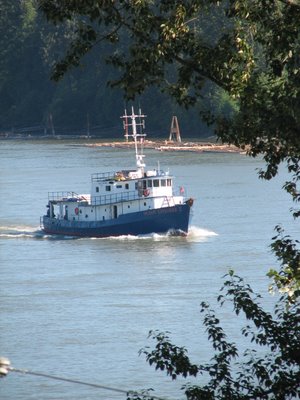
Some 40 miles east up the Fraser River from the Pacific Ocean, Port Haney still sees a wide variety of ships of all sizes passing through.
They say that one day container ships carrying 'short sea containers' will be common place as the government aims to decrease road volume by increasing commercial transport on our rivers and rail networks.
Community youth fight meth addiction
Claus Andrup│What do you know about meth addiction?
The majority of families in Pitt Meadows and Maple Ridge will never have to deal with the tragedy of addiction to crystal meth in their lives. For most of us crystal meth is something we read about in the press, see glimpses of on TV in documentaries or advertisements, or are reminded of each time we drive along East Hastings on our way back from a hockey game or concert downtown.
Politicians discuss crystal meth addiction, much in the same way that they discuss health, education or the environment. We expect them to do so and they never disappoint. As is often the case however, it takes the community itself to make the transition from ‘discussion’ to ‘action.’
Through a chance meeting between my wife Deborah and an acquaintance, Rani Bellwood, I came to find myself sitting among 50 or so young people in the Youth Lounge at Pitt Meadows recreational centre on a recent Saturday evening. Rani had suggested to my wife that we may want to attend an educational evening for youth. The theme for the evening was “Life or Meth.”
I thought that 50 or 60 children was a great turnout. They had many questions on the subject of meth and meth addiction, and were keen to share what knowledge they had gleaned informally and, perhaps more importantly, seemed eager to expand their knowledge.
The Life or Meth presentation combined videos and slides with the acting-out of two young simulated addicts who told their stories based on the lives of real characters with whom they had been in contact with or directly from RCMP or VPD reports.
Most of us are familiar with the fact that crystal meth is highly addictive and almost impossible to shake. We know too that it attacks its victim physically and mentally with severe consequences and that death is a common outcome.
Perhaps the cruelest thing about crystal meth is that once introduced to the system it immediately robs the user of his or her reason. The challenge for outreach workers and youth coordinators, it seemed to me, was how on earth do they make addicts understand in the first instance that they have a problem and second, that if they do not kick the habit, they may find themselves in the morgue?
To combat such a powerful drug takes resolve, persistence, ingenuity and the involvement of the entire community from every walk of life. In Maple Ridge and Pitt Meadows this seems to be taking place, as demonstrated by people such as Rani Bellwood chairperson of the Life or Meth Youth Forum Organization Committee, Tony Cotroneo Youth Services Coordinator for Pitt Meadows and Maple Ridge, Mary Robson chairperson Maple Crystal Meth Task Force, Andrew Tolchard Chairperson for the Pitt Meadows Crystal Meth Task Force and the community partners that assisted.
As parents and adults our views of the addicted vary. Some of us may lump together, or associate a number of unpleasant aspects of the state of our communities. Homelessness, crime, addiction, production and distribution of drugs, prostitution and child neglect become, as it were, a single issue which we think of now and then, but choose to ignore if we possibly can. Until, of course, the day that the problem walks in our own front door in the form of one of our own children.
Parent blame has always been central to any discussion where teen behaviour is concerned. What causes certain behaviour patterns in our youth? Given that our children are subjected to having to watch mum and dad’s behaviour on a daily basis and having to listen to what mum and dad have to say about this issue or that, it is hard to absolve parents from the absolute responsibility of how children respond during the long and often arduous process of becoming adults.
Parents, for their part, are not born experts and most of their training can be said to be of the ‘on the job’ variety.
That said, the least one can expect from parents is curiosity. Bringing up our children should involve a lot of who, where, why, what and when?
In the case of drug addiction among youth the call for who, where, why and when becomes even stronger as the answers to the questions can save lives and whole family structures; and ultimately whole communities.
Here are three basic questions that parents in Maple Ridge and Pitt Meadows should be asking themselves.
- What are the chances my child will be exposed to this, and will try it
- If my kid is using it, how to I detect that?
- If I think my kid is using, what can I do about that?
The hackles will rise on any parent at the suggestion even that a child of theirs could become a drug addict. Oddly, today it is the youth themselves, at least in this community, who seem to be asking more questions than the parents. This bodes well for future generations and for the quality of life we can expect many decades down the road.
The probability: General population surveys on alcohol and other drug use are often done by telephone interviews. You may have even participated in surveys done through questionnaires at your school. These studies show a low rate of Meth use in the general population.
For example, a major recent survey, the Canadian Addictions Survey 2004 (CAS), asked people about their use of "speed", an informal term that covers all amphetamines, including Meth. The CAS showed that 0.8% of Canadians reported using speed at least once in the previous 12 months.
That doesn't seem like a big percentage so why the big deal?
First, 0.8% of Canadians 15 years and older equals about two hundred thousand people so, while that number is much smaller than some other substances, it's still significant. Also, standard surveys and interviews in the general population likely miss hard-to-reach people such as street youth. Information from other sources suggests that Meth use is much higher among this group.
Information, such as hospital admissions, shows that the number of people seeking treatment for Meth problems is growing. Police have also uncovered more clandestine laboratories producing Meth. They have also seized greater quantities of Meth. All these factors point to increasing Meth use, particularly in British Columbia, Alberta, Ontario and Quebec.
The signs: User Denial, Family Member Denial, Enabling, Codependency, Personality changes, Immaturity (avoiding responsibility) Self-Esteem, Suicide attempts, Changes in Relationships, Lack of Motivation, Changes in Thinking, Concentration & Memory, Values and Beliefs, Denial & Lying, Changes in Sleeping and Eating patterns, Reckless & Impulsive behavior, Changes in Physical Appearance and Health, Changes in Personal Habits and Activities, Mental and Behavioral Changes, Arising Legal Problems.[2]
Action: In today’s world help is everywhere, thanks largely to the ubiquity of the internet. Each community recognizes the threat of meth addiction among youth. In Maple Ridge and Pitt Meadows we are fortunate to have among us the leadership and volunteers who understand the need to come to the assistance of victims of the proponents of illicit substances.
People such as Rani Bellwood, Tony Cotroneo, Mary Robson chairperson Maple Crystal Meth Task Force, Andrew Tolchard and a small army of youth community partners are poised to help and guide any parent in need of advice. The irony should not be lost here; in large part our volunteer youth are standing by to help parents who do not know how to react to the addictions that may be affecting their own kids. Youth helping adults – perfect.
Maple Ridge, October 2006
www.crystalmethtaskforce.com
[1] http://www.crystalrecovery.com/Recovery/Recovery.html
[2] http://www.drugwise-droguesoisfute.hc-sc.gc.ca/facts-faits/meth_e.asp#e
Sunday, October 22, 2006
Saturday, October 21, 2006
The Partioning Option
The word partition shares letters with another infamous word; apartheid. Whatever happened to tolerance and the inclusive aspirations one reads so much of in the good books of the religious. Are we not as a race, in theory at least, supposed to embrace one another, notwithstanding belief, colour, gender or culture?
When we harm one another where is the inclusiveness? How do we embrace when we embrace in death and hurt?
It is with morbid interest that we witness now the sudden notion that perhaps only a partitioning of Iraq will result in a lasting peace or at the very least a lasting, but peaceful, mutual fear. Is this the democracy that architects of the invasion of Iraq had in mind? Did they sit down and say: First we will invade because we fear that Saddam Hussein will destroy millions with his WMDs, then we'll just say that we came to save the Iraqi nation from Saddam, then we'll say they could with a good dose of western democracy and become of the American dream, then if that don't work, hell, we'll just partition the suckers to save 'em from themselves. 800,000 dead Iraqis, 5000 US servicemen and counting, a bill for one thousand billion US dollars (and counting), a confused and sickened US public. For what, the next thing that pops into the Whitehouse's mind?
What brilliant idea, one wonders, will follow the proposal for partitioning Shia, from Sunni from Kurd? Perhaps they can all join the boy scouts and sit around camp fires singing "Hail to the Chief - the idiot"? Donald Rumsfeld, I have very little doubt, will bring the marshmallows to roast over the open fires.
Friday, October 20, 2006
Iraq pullout imminent?
Thursday, October 19, 2006
Tolstoy made me think of this
Then some minutes later it struck me that: men of peace are sometimes made to feel awkward and even silly when it is the men of war who are the final arbiters peace and coexistence.
October 19, 2006
A birthday for peace
AfriCanada?
Throughout history Africa and Canada cannot be said to have had strong connections. Nonetheless, the continent of
Africa has from time to time been on Canada’s radar and once in a while the opposite has been true; there have been moments when Africa has needed Canada if for nothing else than temporary refuge. Travel back far enough in time and the researcher will find that at one point Canada even went to bat for the old Empire against the Boers during the Boer War.
Some months earlier I wrote a short piece in my blog, RadioHaney, pointing out that between them Canada and Africa formed a formidable force as a ‘resource cartel.’ Here again, history will point to the fact that for decades the relationship between South African and Canadian companies, organizations, individuals, investors and professional has grown stronger and stronger. The fact that many South Africans chose Canada as their home both during the apartheid era and in the decade plus since the fall of apartheid, has done much to enhance the relationship between the two countries and indeed, as such, the general relationship between Africa and Canada.
It could be said that hardly two less compatible or similar relationships exist in the foreign affairs arena. Canada and Africa are not only geographically distant, but remain distant in almost every aspect from climate to government to national mores and characteristics. Despite these differences however, a distinctly tangible bond can be discerned through reports in the media and via anecdotal evidence.
Much to my surprise I learnt recently that a friend of mine working at a state-owned iron ore terminal on the west coast of the Cape receives his monthly cheque from a company based in Mississauga, Ontario. The question arises, how many more opportunities exist for Canada to be the outsourcing host of choice for the South African government and large South African multi-nationals? And what, if any, trade offs lie hidden in this burgeoning relationship?
Vancouver Sun columnist Jonathan Manthorpe, in his October 19, 2006 story: For many, retirement is too good for Mugabe, quotes Zimbabwean lawyer Gabriel Shumba as saying: “We believe Canada has some of the most progressive pieces of legislation in international law on human rights,” and: “We would like to see Canada utilize some of its own laws against Mugabe because we believe jurisdiction of legislation is not limited to criminals or victims who are Canadian citizens.” These statements by Mr. Shumba, while specifically aimed at the catastrophic rule of Robert Mugabe, nonetheless go some way to highlighting yet another area of governance and economics that exist for collaboration between certain – perhaps all – African countries and Canada.
The notion of strengthening alliances between Canada and Africa falls outside of the parameters of party politics; it is not a Conservative, Liberal, NDP or Bloc-driven issue. It should be apparent to Canadians that as arbiters of responsible civic management and as good fiscal managers there exists obvious and tangible benefits in a symbiotic relationship between these distant places. Is there, for instance, any reason why Canadian manufacturers should not be enticed by large and hopeful workforces in Africa in a trade off of labour for technology, or production for management?
The September 28, 2005 piece follows for reference below:
South Africa and Canada can be resourceful partners
Growing up and being schooled in South Africa in the 1950s and 1960s resulted in a keen awareness of the fact that the country we lived in was a key player in the world's supply of many natural resources. Gold, diamonds, coal, uranium and iron to name a few. Writ large across the country's history were the names of Cecil John Rhodes, Barney Barnato and in more recent times such royal families of mineral exploration as the Oppenheimers.
From the start the scramble for mineral fortunes was reflected by both the obvious benefits to the individual adventurers from Europe and the pain and indignity forced upon the indigenous peoples of this newly occupied region. That is all behind us now. The resources themselves however remain in abundance.
Canada, while successfuly hiding the negative impact of the British and the French adventurers in the form of early trappers and later the Hudson Bay Company, is the home of an equally rich reserve of resources, almost matching if not beating South Africa in terms of natural wealth. As a team on the international resource stage, the combination of these two nations presents a formidable partnership.
Such an alliance would be built not simply on the resources themselves, but on the knowledge, skills and experience that has developed through the channels of the corporate and academic organizations in both countries. Relative economic stability, threatened only by the Boer War, two world wars and in the case of South Africa, the troubled era of Apartheid, has meant that these two countries have been able to advance their technologies at a faster pace than most other sovereignties with the exception perhaps of the United States. Russia and China while promising greater natural wealth remain less capable of mineral exploration and exploitation and politically less stable.
Today South Africa's interest rates, while still high, are coming closer in line with their peer countries such as Canada, consequently opening the doors to smoother future cooperation.
As early as the late 1970s South African entrepreneurs saw the potential for Canada as a shelter from, it seemed, South Africa's uncertain future. Interestingly too was the arrival in Canada of white Rhodesians who felt even more threatened in Africa than their kinsfolk in South Africa. The Rhodesians, it turns out, had more to fear than the South Africans.
By the time the 1990s rolled around and even more so in this new century, the presence of South African resource specialists and the companies who employ them has grown dramatically in Canada. It seems that the foundations for a strong partnership has already been laid. Curiously, there is little or no evidence of any concious political drive to initiate, support or promote this partnership. Canadian politicians are as much to blame as their South African counterparts.
The two countries could probably benefit from snuggling up closer to one another than they they have so far. South Africa and Canada have much to offer one another. Science, technology, communications, humanities, housing, social services, commerce and trade, political and corporate governance, medicine, transport, international trade, sustainable growth, urban development, aerospace, arts and culture.
Canada has helped South Africa in two strangely oriented, perhaps opposing ways. Canada has historically voiced its public opposition to the Apartheid system in the United Nations (while, it must be said, supporting its own equivalent apartheid-lile policies with respect to Canada's indigenous peoples) and on the other side of the equation Canada has welcomed many white South African immigrants who fled the uncertainties of South Africa in the 1980s and 1990s. This migration, while driven intitially by fear, may now prove beneficial to both countries.
Given the ambiguities of NAFTA and the inward-looking policies of Washington and Congress, combined with a less than welcome US attitude towards the United nations, it seems to this observer that the time for South Africa and Canada to form stronger trade and political ties is upon us. Combine these two remnants of the Commonwealth and then add in the presence of a powerful Europe and the future, to this observer a least, seems a lot brighter.
Wednesday, September 28, 2005
Wednesday, October 18, 2006
Early signs of split in homosapiens
Human species 'may split in two'
"Humanity may split into an elite and an underclass," says Dr Curry. "Humanity may split into two sub-species in 100,000 years' time as predicted by HG Wells."
If there is any doubt to this notion Radio Haney directs its reader(s) to Congress where early signs of the split can be detected almost daily.
" Evolutionary theorist Oliver Curry of the London School of Economics expects a genetic upper class and a dim-witted underclass to emerge. " Radio Haney further notes that the dim-witted underclass may soon loose a singnificant number of seats in Congress to be by replaced by a genetic upperclass once typified by the Kennedy family.
For the full story go to: http://news.bbc.co.uk/2/hi/uk_news/6057734.stm
Saturday, October 14, 2006
Hasta la vista, baby Kim.
Once again our international leadership is sucked in by the dramatics of the clownish behaviour of an idiot trying to gain attention on the world stage – no disrespect intended towards professional working clowns who provide the laughter needed to distract us from the appalling ineptitude of the United Nations.
This guy is just getting too much airtime, and lovin’ it. Once in a while a bad egg will show up, posing a real threat to his region or perhaps even the world at large. The fellow shown here is not in this class. While recognized as a mean bastard of a leader by his people and observers abroad, it is foolish and indicative of a certain lack of sophistication that the Security Council is lathered up over this chap.
One can see clearly the road ahead. Discussion among the members, suggestions, threats, a vote, another toothless resolution, more debate, more resolutions followed by disagreement over the same things we disagreed over before; the chief among them being sanctions versus action.
What irritates perhaps more than anything else is that history itself points to so many instances where nations have risen in protest against regimes and leaders who have conducted themselves in somewhat less than humane ways. The Pan-Africanist movement in South Africa successfully overcame the apartheid regime, notwithstanding that some sanctions were indeed implemented by the world community. For that matter many nations throughout Africa held true to the Harold Macmillan forecast in his ‘winds of change’ speech delivered in the 1950s to a then disbelieving white leadership in Southern Africa. Most of Africa is now free of the European Kim Jong Ils of an earlier age. Asian nations have spent thousand’s of years in similar turmoil, constantly changing from school of political thought to another, either through force or by choice.
Is it perhaps not time that the people of North Korea rose up and dumped this fellow? There are many, many people prepared to lend a hand in the exercise. But the drive has to come from within North Korea, not from within the inner sanctum of the Security Council. For the better part the Security Council is more concerned with the security of their jobs. Little Kim, but acting out the role of nuclear nut has done little to create a real threat and a lot to creating jobs for life for those lucky enough work for the United Nations.
While the United States impresses us with its ability to measure radio activity in the air above North Korea who is busy measuring or forecasting the affected areas of ‘egg on our faces’ in a few years when it comes to pass that Kim Il Jong does not have two beans to rub together, let alone two atoms. This one has Hans Blix written large all over it. One might recall this quote from the BBC: “Speaking to the BBC's World Service, Mr. Blix said he was more certain than ever that there was no WMD in Iraq.” I wonder if Blix is still on the contact list on the new Secretary General’s Blackberry. He may be well advised to give Hans a call.
Who can fail to remember the hundreds of thousands of hours we helped the media with when it came to being intrigued by the life and times of Saddam Hussein. Well, from the people who brought you Osama and Saddam, watch out, because here comes Kim “it’s an IL nuclear wind that blows no good” Jong.
Sanctions are too expensive and time consuming. If Kim wants to play with the N-gang then the best solution, by far the cheapest and perhaps less costly a (in the collateral sense) is to drop one right on top Kim and end the discussion right there. The bush assault on Iraq has cost some 700,000 lives and 500 + billion dollars. From every aspect, including humanitarian, a nuclear answer to a nuclear threat would seem to the elegant solution in this instance. Shareholders of CNN may not wish to hear this as while it may be a big story it would also be a short story and we would soon be back to fighting terror and protecting borders once more, but it is hard to please everyone.
Forget pandering to Kim Jong Il's need for 15 seconds of fame; give him one split second, from one split atom and let’s move on.


